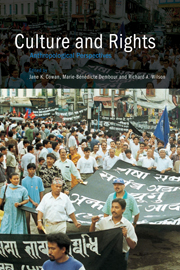Book contents
- Frontmatter
- Contents
- List of contributors
- Preface
- 1 Introduction
- Part I Setting universal rights
- 2 Changing rights, changing culture
- 3 Following the movement of a pendulum: between universalism and relativism
- 4 Imposing rights? A case study of child prostitution in Thailand
- 5 Gendering culture: towards a plural perspective on Kwena women's rights
- 6 Between universalism and relativism: a critique of the UNESCO concept of culture
- Part II Claiming cultural rights
- Index
6 - Between universalism and relativism: a critique of the UNESCO concept of culture
Published online by Cambridge University Press: 05 June 2012
- Frontmatter
- Contents
- List of contributors
- Preface
- 1 Introduction
- Part I Setting universal rights
- 2 Changing rights, changing culture
- 3 Following the movement of a pendulum: between universalism and relativism
- 4 Imposing rights? A case study of child prostitution in Thailand
- 5 Gendering culture: towards a plural perspective on Kwena women's rights
- 6 Between universalism and relativism: a critique of the UNESCO concept of culture
- Part II Claiming cultural rights
- Index
Summary
Introduction
In a scathing attack on the classic Herderian–Boasian concept of culture and its potential for generating both relativism and chauvinism, Alain Finkielkraut (1987) notes that although the United Nations' Educational, Scientific and Cultural Organization (UNESCO) was initially founded in an Enlightenment spirit loyal to the universalist legacy of Diderot and Condorcet, it almost immediately degenerated into a tool for parochialism and relativism. Uninhibited by the possible constraints implied by detailed knowledge regarding the topics under scrutiny, Finkielkraut was able to present a powerful, coherent and, in many people's view, persuasive criticism of the widespread culturalization of politics and aesthetics in the late twentieth century. Arguing that the meaning of culture has slid from Bildung to heritage, from universalistic thought to relativistic anti-thought, his book on ‘the defeat of thinking’ has been widely read and translated over the past decade.
In Finkielkraut's book, UNESCO is given a central role as a chief villain (along with social anthropologists, those dangerous purveyors of relativist nonsense). In this chapter, UNESCO's ideology of culture will serve as a point of departure, engaging current debates over culture and rights with the most recent and most comprehensive statement from UNESCO regarding culture in the contemporary world, namely the report on Our Creative Diversity (World Commission on Culture and Development 1995), a document which heroically and often skillfully attempts to manoeuvre in the muddy waters between the Scylla of nihilistic cultural relativism and the Charybdis of supremacist universalism.
- Type
- Chapter
- Information
- Culture and RightsAnthropological Perspectives, pp. 127 - 148Publisher: Cambridge University PressPrint publication year: 2001
- 107
- Cited by

